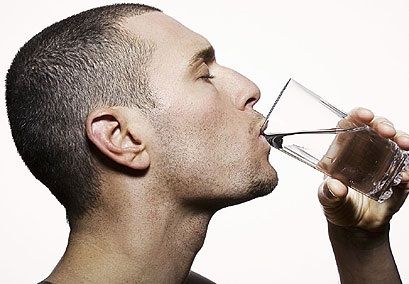The amount of water a person needs to drink per day can vary depending on a variety of factors, including their body size, activity level, climate, and overall health. However, a general guideline often cited is to drink at least 8 glasses of water per day, which is equivalent to about 64 ounces or 2 liters.
This recommendation is based on the idea that the human body needs a certain amount of water to function properly, including maintaining proper hydration levels, regulating body temperature, and supporting various bodily processes. However, it’s important to note that this recommendation is a general guideline, and some people may need to drink more or less water depending on their individual circumstances.
It’s also important to remember that the 8 glasses per day recommendation includes all fluids, not just water. Beverages such as tea, coffee, and juice, as well as foods with high water content, can all contribute to a person’s overall fluid intake.
Ultimately, the best way to determine how much water you should drink per day is to listen to your body and drink enough fluids to stay adequately hydrated. Signs of dehydration can include thirst, dark-colored urine, fatigue, and dizziness, so if you experience any of these symptoms, it may be a sign that you need to drink more water.
Why your body needs water?
Here’s some facts why your body needs water.
Blood is made up of 80% water and requires water for the formation of new blood cells. Your bones are composed of 50% water and also require water for the formation of new bone cells. Water removes pollutants and toxins from your body – through the lymphatic system, kidneys and intestines.
Drinking water ensure adequate hydration and thereby reduce pain, if present. Water regulates the metabolism, so you need to drink plenty of water, especially if you are of a somewhat heavier build.
Drinking water cleans your skin and makes it glow. This of course does not happen overnight, but regular drinking of adequate amounts of water will certainly show results in long term.

Image source: healthiack.com
Water relieves headache – and headaches are very often caused by dehydration. Drinking water in combination with consuming a lot of fiber will boost your metabolism and enhance slow digestion. Your digestive system needs a lot of water to operate properly.
And last, but not least. Drinking water is one of the best ways to fight obesity. First, because water itself is not caloric. Second – we often think we are hungry, but we are actually thirsty. So before you reach for calorie snacks rather drink a glass of water and maybe you will cease to be hungry.
How much water is enough?
There are different guidelines on how much water should one drink per day. Various international organizations such as World Health Organization WHO recommends different amounts, depending on age and gender. This amount ranges from 3 pints (1.5 liters) to 7.8 pints (3.7 liters) of water per day.
The amount of needed water per day also depends on a person’s geographic location – for example, people that live in Africa should drink more water than people who live in North Europe (temperatures in Africa are much higher than temperatures in North Europe). If you are doing sport this amount is even higher, because while you’re active you lose a lot of water sweating.
In principle, it is necessary to drink 2 pints (1 litre) of water for every 1000 calories consumed. Children require 3 pints (1.5 liters) of water per day and adults require 4 to 6 pints (2 to 3 liters) of water per day. Older people should drink about 5 pints (2.5 liters) of water per day. Pregnant women should drink more water per day – at least 4 pints (2 litres) per day.







































![Facts About Vision Impairment Worldwide [Infographic ] glasses](https://healthiack.com/wp-content/uploads/2014/10/glasses-100x70.jpg)


[…] weight this is all well and good, but your body still needs the correct nutrients from food and water to continue doing what it needs to do – to continue functioning properly. It also needs other […]
[…] in most of the cases it is pale yellow. Pale color is a result of sufficient hydration; when not drinking enough water, urine becomes concentrated and its color is more intense (ref. […]